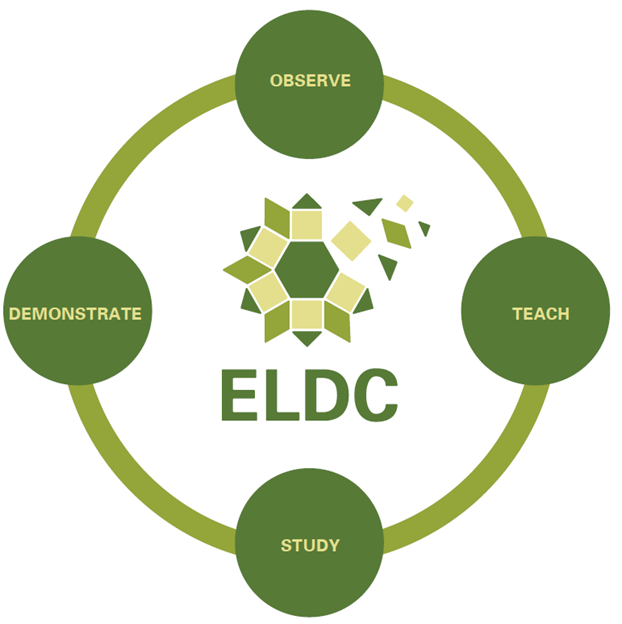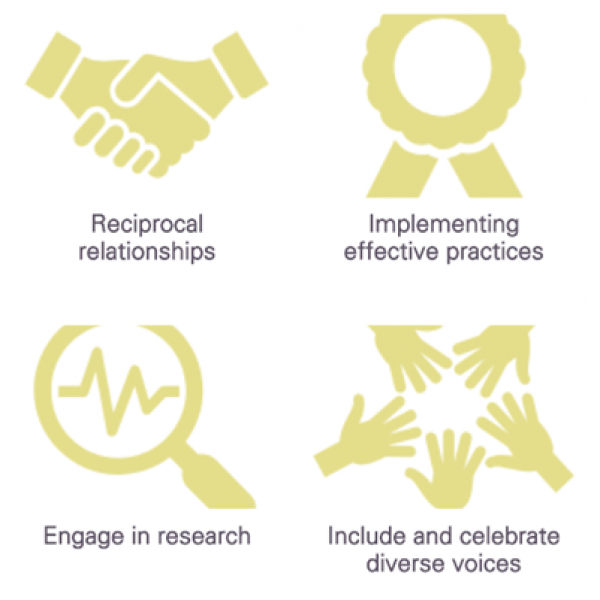Contact the Early Learning and Development Center
Our Vision, Mission, and Program Philosophy

Cultivating life-long researchers through high-quality care and inclusive education
Mission: Provide the highest quality care of young children and demonstrate, observe, study, and teach exemplary and inclusionary practices in early childhood education and early childhood special education through the following goals:
-
Serve children of NAU students, faculty, staff, and community members with an environment that supports children holistically through a strengths-based lens. The NAU ELDC will engage in reciprocal relationships with families in order to connect their knowledge with the pedagogy of early childhood education.
-
Serve as a site for teacher education, interdisciplinary collaborations, and professional development by providing a context for implementing effective practices in the field of early childhood education.
-
Extend knowledge and cultivate early childhood practices by providing opportunities for students, teachers, and faculty to engage in research within an early learning context.
-
Honor the university’s Hispanic-Serving Institution status and its commitment to becoming the nation’s leading university serving Native Americans. The NAU ELDC will include and celebrate Hispanic and Native American voices within the program.
Our program standards
We exemplify an inquiry approach to teaching and learning, improving inclusive early childhood pedagogy through education, research, and community engagement.
Curriculum Goals Accordion Closed
The NAU ELC utilizes an inquiry approach to teaching and learning using an assets lens to view children and their families as collaborators in the learning process. We believe all children are capable and should be provided with the opportunity to engage in critical thinking and problem solving in real world contexts. The Project Approach is used as a framework to support authentic learning experiences aligned with early learning standards. Through the three phases of the Project Approach, children engage in inquiries across all content areas.
-
Children are viewed from an asset lens, and curricular design will highlight the unique capabilities of each child. The curriculum is designed to support the needs of the whole child.
-
Through inquiry-based learning, children will explore the world around them and their role in it.
-
All children are valued as individuals, and the unique perspectives and experiences of all children and families in our program are celebrated
Highly qualified teachers and staff Accordion Closed
We meet or exceed National Association for the Education of Young Children (NAEYC) personnel requirements. Our mentor teachers have a minimum of a bachelor’s degree in early childhood education or early childhood special education and a minimum of five years’ experience. Our assistant teachers have a minimum of a Child Development Associate (CDA) credential and/or college credits related to early childhood education or child development with at least one year of experience.
Each staff member engages in a professional development plan and has access to coaching, training, and education benefits.
Adult-child ratios Accordion Closed
We meet or exceed the required NAEYC staff/child ratios indoors and outdoors (10.B.12). Ratios are lowered when warranted due to an individual or special needs, especially on field trips depending on destination, expected crowd conditions, the extent to which the destination space is open/confined, etc. Teachers take a cell phone, emergency contact information, and a first aid kit on all field trips (3.C.02-05).
Group (max size)
2s
3s
4/5s
ADHS (Arizona Department of Health Services)
1:8 (16)
1:13 (26)
1:15 (30)
NAEYC
1:6 (12)
1:10 (10)
1:10 (20)
ELDC Classroom/ Playground
1:6 (12)
1:10 (10)
1:10 (20)
Family and community partnerships Accordion Closed
Families are central to children’s development and are an integral part of the NAU ELDC’s philosophy. We utilize technology to encourage and promote two-way communication, have an open-door policy to invite families and partners to share their experiences and resources, and host activities for all to learn about child development and exemplary early childhood education practices. The ELDC also utilizes departments at NAU to increase the resources available to children and families.
Anti-bias commitment Accordion Closed
The ELDC actively works to implement the following practices:
-
Develop a program that is inclusive of all individuals with a lens on diversity, equity, inclusion, and social justice
-
Explore and review our practices to ensure that traditionally underserved populations are represented in a socially just manner
-
Act and educate against bias and unfairness in a developmentally appropriate manner
Research and pedagogy Accordion Closed
The NAU ELDC will be a demonstration school that models NAEYC standards. Students within the College of Education will have access to student teaching and practicum placements. A research program will be in place to continue to further the field of early childhood education and child development studies. Research projects that benefit the children, families, or staff of the ELDC will be considered, and findings will be shared publicly.
Practicum and student teaching Accordion Closed
The ELDC accepts practicum and student teaching placements by recommendation only. A limited amount of placements will be allowed to preserve the quality of the programming and the experience of the children enrolled. To be considered for a placement at the ELDC, please contact the Director of the ELDC.
Curriculum Goals Accordion Closed
The NAU ELC utilizes an inquiry approach to teaching and learning using an assets lens to view children and their families as collaborators in the learning process. We believe all children are capable and should be provided with the opportunity to engage in critical thinking and problem solving in real world contexts. The Project Approach is used as a framework to support authentic learning experiences aligned with early learning standards. Through the three phases of the Project Approach, children engage in inquiries across all content areas.
-
Children are viewed from an asset lens, and curricular design will highlight the unique capabilities of each child. The curriculum is designed to support the needs of the whole child.
-
Through inquiry-based learning, children will explore the world around them and their role in it.
-
All children are valued as individuals, and the unique perspectives and experiences of all children and families in our program are celebrated
Highly qualified teachers and staff Accordion Closed
We meet or exceed National Association for the Education of Young Children (NAEYC) personnel requirements. Our mentor teachers have a minimum of a bachelor’s degree in early childhood education or early childhood special education and a minimum of five years’ experience. Our assistant teachers have a minimum of a Child Development Associate (CDA) credential and/or college credits related to early childhood education or child development with at least one year of experience.
Each staff member engages in a professional development plan and has access to coaching, training, and education benefits.
Adult-child ratios Accordion Closed
We meet or exceed the required NAEYC staff/child ratios indoors and outdoors (10.B.12). Ratios are lowered when warranted due to an individual or special needs, especially on field trips depending on destination, expected crowd conditions, the extent to which the destination space is open/confined, etc. Teachers take a cell phone, emergency contact information, and a first aid kit on all field trips (3.C.02-05).
Group (max size) |
2s |
3s |
4/5s |
ADHS (Arizona Department of Health Services) |
1:8 (16) |
1:13 (26) |
1:15 (30) |
NAEYC |
1:6 (12) |
1:10 (10) |
1:10 (20) |
ELDC Classroom/ Playground |
1:6 (12) |
1:10 (10) |
1:10 (20) |
Family and community partnerships Accordion Closed
Families are central to children’s development and are an integral part of the NAU ELDC’s philosophy. We utilize technology to encourage and promote two-way communication, have an open-door policy to invite families and partners to share their experiences and resources, and host activities for all to learn about child development and exemplary early childhood education practices. The ELDC also utilizes departments at NAU to increase the resources available to children and families.
Anti-bias commitment Accordion Closed
The ELDC actively works to implement the following practices:
-
Develop a program that is inclusive of all individuals with a lens on diversity, equity, inclusion, and social justice
-
Explore and review our practices to ensure that traditionally underserved populations are represented in a socially just manner
-
Act and educate against bias and unfairness in a developmentally appropriate manner
